Every day, we are exposed to over 130 chemicals across a wide range of personal care items we utilize. Choosing more natural, sustainable products for cosmetics, period care, and around the house, in general, will drastically minimise your chemical exposure and environmental effect.
As we gain a better understanding of the advantages of reducing our exposure to synthetics, chemicals, and plastics, it's crucial to remember that what we put inside our bodies is just as significant as what we put on our skin.
The 4 most important questions you should ask yourself while selecting natural skin care products are:
Going Natural – What’s The Big Deal In The First Place?
Parabens are commonly found in cosmetic products because they mimic natural hormones. They have the potential to cause harm to the body. Synthetic perfumes, plastics, artificial colours, sulphates and mineral oils are all typical ingredients in the goods we routinely use. While skin was formerly assumed to be a nearly impenetrable barrier, it has now been proved that up to 64% of the items we apply topically are absorbed into the bloodstream, so removing superfluous chemicals here goes a long way toward lowering overall chemical exposure.
Where Does It Come From?
What exactly is it made of? Is it derived from nature, such as plants, animals, minerals, or marine sources? Is it derived from petrochemicals, or is it something else? Here is a useful breakdown:
Naturally Occurring: This signifies that the substances are used in their raw, natural state. Ex: Raw honey and crushed flowers.
Nature Identical: This indicates that the substances are manufactured in a lab and are chemically identical to those found in nature. Sorbic acid is an example. It is originally extracted from rowan berries, and is now widely used as a nature-identical component.
Synthetic: Ingredients that were developed and processed in a lab fall under this category. Parabens, which are commonly used as beauty preservatives, are an example of this.
We are also thinking about covering the beauty industry jargon in a future blog. So stay tuned to stay informed.
How Is It Processed?
Ingredients aren't necessarily processed naturally, just because they're derived naturally. The ingredients in your beauty products are either physically or chemically treated.
- Physically processed means the molecular makeup or structure remains unchanged.
- Chemically processed refers to changes in the molecular composition or structure.
Raw, unprocessed oils and butters are examples of naturally sourced but physically processed products. These are treated using techniques such as cold pressing and filtering.
Castor wax is an example of a naturally sourced but chemically processed substance. It's a castor bean-derived vegetable wax made by adding hydrogen to pure castor oil - a process known as hydrogenation.
Do You Know Your Labels?
Under the umbrella of "natural" products, there are a variety of certifications and marketing terms. Some are regulated, while others are not:
Organic
Companies can have their products be certified organic. They also may use the term "organic" to denote that all of the ingredients are sourced from organic sources. This means that though the product itself may not be certified organic, all of the ingredients are.
Are you looking for a USDA-certified organic brand? Try the ‘100% PURE’ label. These products are non-toxic, cruelty-free, vegan, and free of parabens & sulphates. The packaging, in most cases, is eco-friendly as well.
Green
This is an unregulated label that relates to environmental impact and long-term viability.
Green products are typically made with the goal of reducing environmental effects.
A green product, for example, may contain raw materials that are gathered in a way that benefits rather than harms the environment.
Clean
This is another unregulated label that refers to goods that are normally non-toxic.
Vegan
These items are made without the use of animal by-products. They are made using hand-harvested ingredients and are gluten-free and GMO-free.
Cruelty - Free
It's worth noting that, while vegan items are virtually always cruelty-free, not all cruelty-free items are vegan. An organic lip balm containing beeswax, is an example.
These words can be claimed by brands without having to be certified. However, there are various organisations that certify vegan and cruelty-free items if you want to make sure.
Fair-Trade
This regulated label is all about sourcing - making sure that materials are sourced responsibly as far as the earth, the people, and the environment is concerned.
If you would like to step back and look at the big picture, check out what we have to say about sustainable living.




Leave a comment